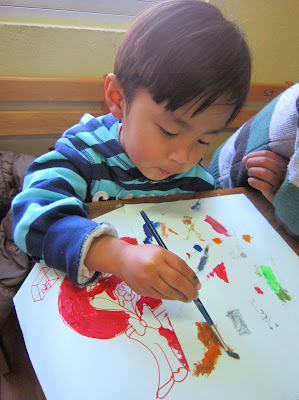He
offered me a wooden stool next to his bed. I dragged it gently, and sat on it. As
usual, Jigme Pelden was lying down on his bed in his room.
“I just
finished my prayer,” he started the conversation, with a bright smile. Meanwhile,
he folded his prayer beads and pushed it under his pillow.
The
room was warm, heated with electric heaters. Four other elderly patients also
shared the room. And in this room of the Patients Guest House of JDWNR
Hospital, Jigme Pelden has been staying for the past two years. Always lying on
the bed, and taking medications.
On
the window, adjacent to his bed, was his small space for praying – a few kupar
(religious portraits) affixed and incense sticks burning. Right below it, on a
cardboard box, there was a stack of notebooks and a few Dzongkha novels.
“Have
you completed writing your book?” I asked him, rather curiously. By the way,
Jigme Pelden was writing a book. And I visited him, this time, particularly to
know about his book.
“Yes,
I completed it. Finally,” he replied me. A gleeful smile instantly surfaced on
his face. “The book is all about my life. An autobiography,” Jigme continued,
his smile ever growing.
“There
are only few people who have lived and are enduring the kind of life that I
live. I hope that this book of mine would help other people understand our
lives and support us,” he explained to me.
In
2010, when Jigme Pelden was only 34, he met with a dreadful accident in
Phuentsholing which has completely changed the course of his life. That time,
as a craftsman, he was painting a building when he suddenly fell down. Half of
his body (below abdomen) remained paralyzed, and he never lived a normal life.
 |
| Jigme's daily chore, weaving rachu |
Worst
of all, after this fateful incident, he was divorced from his wife and he had
to look after his two children even in such condition.
“Sometimes,
everything was just not fair. God is unfair. Life is unfair. But yet, we learn
to accept of what simply is,” Jigme shared his opinion, as I stared at him,
marveling at the way he was speaking. He speaks with a great passion. And he
is, undeniably, a wise person.
Then,
we stood in silence. Even though I wanted to continue our conversation, I have
no idea what to say or how to say it, so I just gazed outside, beyond the window.
Out in the open - everyone looked happy. They were walking, running and
laughing. Free.
It
pained to see Jigme lying in the room, chained to his bed. For how long, I don’t
know. And my inquiring mind frequently wanted me to ask him how it feels to see
other normal people outside or what it’s like being a paralyzed person. But I realized
it’s a terrible thing to ask, and I shut it up in my mind.
In
a while, Jigme took out a pair of notebooks in which he wrote his book. He has
never attended any schools; however, he learned Dzongkha at home. The book is written
in Dzongkha, and one of his supporters has been helping him translate it into
English.
The
gentle afternoon sunlight flooded the room. Jigme began reading out for me a
small paragraph from his book,
“Sometimes
I feel that the only cure to my suffering is writing on. Because for a person
like me, writing is transformative, healing. And I write this book to tell you
exactly.”
As
he reads out, he smiled and fumed at the melody of the words. I was amazed by
the way he has built the words and crafted sentences in his book. They are just
gorgeous, overwhelming.
More
exciting, the book contains many beautiful poems and heartbreaking lyrics that
he had composed when he was young man back in his village, Khoma, Kurtoe. And he
has woven all that together beautifully in the book.
Oh,
how wonderful it’s to sit next to a brilliant writer and listening to his book
all afternoon. Like this.
“You
know what? It takes commitment to write a book. All cannot do it. Only those people
who have discovered purpose in their life can write,” this aspiring young
writer told me. I agreed with him, genuinely impressed.
The
sundown was approaching, and the daylight has already grown weak. Outside, it
started to rain. It was a typical Fall day. Intermittent rains. Cold.
I
stood up, leaned over and gave him a hug, a little tighter than usual. “Please
visit again,” he whispered. I nodded. He offered me an umbrella. I took it.
On
my way out of his room, he shouted at me, “And thank you for the books and
pens.”
I
waved at him, becoming teary. And I walked out of his room; I walked way back my
home. The rain was pouring down. And deep down, my heart glowed, hugely inspired
and awed. I assured, reassured to myself, again and again, “I will be the first
person to buy, read and review your book, Jigme Pelden.”

































